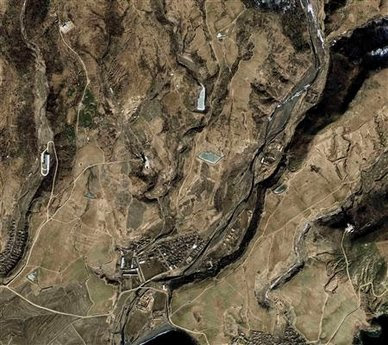JPost.IAF air strike on a building used by Hamas in Gaza City
 IAF strikes northern Gaza following Qassam barrage
IAF strikes northern Gaza following Qassam barrageBy Amos Harel, Avi Issacharoff and Mijal Grinberg, Haaretz Correspondents, and The Associated Press.
Smoke rising from an explosion following an IAF air strike on a building used by Hamas in Gaza City, Thursday. (AP)
The Israel Air Force striked four Qassam-launching squads Saturday in Beit Hanoun in the northern Gaza Strip, following Friday's barrage of Qassam rockets which hit the western Negev town of Sderot. Earlier Saturday, the IAF attacked another Qassam-launching squad in Beit Hanoun, seriously wounding a militant believed to belong to the Popular Resistance Committees, a small militant group with ties to Hamas. The IDF confirmed the airstrike.
Two more Qassam rockets landed in the Sha'ar Hanegev regional council Saturday, causing no injuries or damage. Friday's Qassam attack hit houses in the Negev town and left three people suffering from shock. One man was treated for chest pains, and two people were injured when they tripped while trying to run for shelter following the "Red Color" rocket warning.
Two more Qassam rockets landed in the Sha'ar Hanegev regional council Saturday, causing no injuries or damage. Friday's Qassam attack hit houses in the Negev town and left three people suffering from shock. One man was treated for chest pains, and two people were injured when they tripped while trying to run for shelter following the "Red Color" rocket warning.
All six were taken to Barzilai Medical Center in Ashkelon for treatment. The eight rockets fired in the barrage, three of which hit Sderot, brought the total number of Qassams launched at Israeli communities Friday and Saturday to 32. In earlier attacks, four Sderot residents were treated for shock and a warehouse was damaged.
Palestinians in Gaza also fired a mortar into southern Israel. On Friday afternoon, five rockets were reported to have struck near the coast south of Ashkelon, one of which struck the grounds of Kibbutz Zikim. Hamas, Islamic Jihad and the Popular Resistance Committees claimed responsibility for the Qassam fire. On Thursday Palestinians fired a dozen rockets and eight mortar shells.
Late Thursday, Israel cut back around one percent of the power it supplies to Gaza, Defense Ministry spokesman Shlomo Dror said. Israel will continue gradually scaling back electricity until the territory's Hamas rulers end the rocket fire, he said Friday.
"It's their choice. They need to choose if they want to keep investing in rockets and in attacking Israel or if they want electricity from Israel," Dror said. Hamas said Friday it would not be deterred by Israel's cutback of the power supply to the Gaza Strip, as militants continued to bombard southern Israel with Qassam rocket fire.
"The Zionist enemy must understand that the policy of assassinations, of attacks, of embargo, of cutting electricity and fuel will not halt the resistance and will not break the back of the Palestinians," said a senior Hamas official, Ismail Radwan.
"We warn them of a large volcano that will erupt if their aggression increases." The electricity cut, in which the flow on one of the 10 high-tension wires into the territory was cut by five percent, was the first since the Supreme Court approved cuts in the supply of electricity to the Gaza Strip as a legitimate means of economic pressure - a move sharply criticized by human rights groups.
Thursday's reduction in the supply of electricity marks the beginning of an incremental process aimed at gradually deepening those cuts and reducing Gaza's dependence on Israel, Israeli officials said.
They said the decision to step up cuts in electricity supplies will depend on security assessments and the humanitarian needs of the population there, and may include more power lines. During the first week, the supply will drop by one megawatt of the total of 124 MW Israel supplies the Strip. Israel aims to eventually lower the amount of electricity it supplies the Gaza Strip to a mere five percent of the original total.
Human Rights Watch said Israel's electricity cuts "amount to collective punishment of the civilian population, and violate Israel's obligations under the laws of war." It said the cuts are affecting civilian infrastructure such as hospitals, water-pumping stations and sewage-treatment facilities.
Infrastructures Minister Benjamin Ben-Eliezer said Friday that the human rights groups should be out protecting the children of the Negev who are being targeted by Qassam rockets. Israeli security sources described Thursday's move as gradual and proportional, stressing that the defense establishment would keep its commitment to the Supreme Court not to undertake actions that would result in a humanitarian crisis in the Gaza Strip.
"We need to diminish the dependency of the Gaza Strip on Israel in a variety of areas," Deputy Defense Minister Matan Vilnai said Thursday during a visit to Sderot and Ashkelon. "The Supreme Court ruled that on the matter of the electricity we are acting properly. Our intention is to begin to lower the electricity supply in moderate amounts, while the residents of Gaza build the infrastructure for an independent supply of electricity," he added.
Israeli human rights organization B'Tselem criticized Vilnai's remarks Thursday, saying that his "statements that the aim of the cuts is to assist the Strip to free itself from dependence on Israel is a new peak of cynicism and contradicts the arguments made by the state before the Supreme Court. At this stage Israel prevents the Gaza Strip from developing its independent energy supply - which has caused a deficit of 20 percent in the electricity supply in the Strip, compared to the needs of the population."
Egypt and Israel supply 70 percent of electricity consumed in the Gaza Strip and the rest is produced locally.


Комментарии